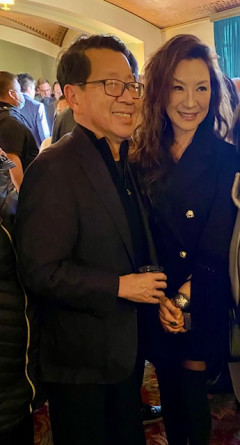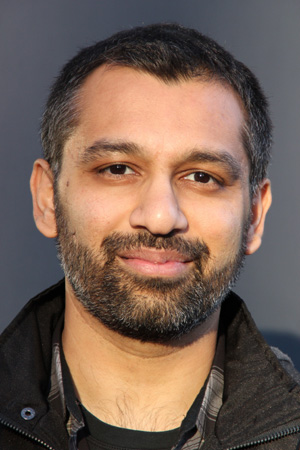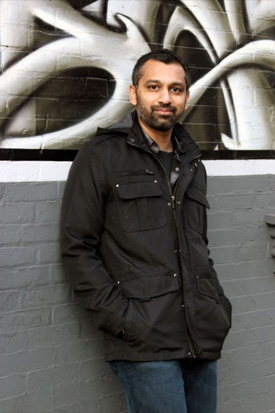Spotlight
What’s Going On? Everything, All at Once By Ben Fong-Torres
Q & A with Soham Mehta, Award-winning Filmmaker of Fatakra

In Soham Mehta’s Fatakra starring Samrat Chakrabarti, Meena Serendib, Ritik Goyal, Raj Vats and Conrad Gonzales, Chakrabarti gives a soulful performance as Naveen, a tailor who left his wife and son in India to chase his dreams in America. During Naveen’s reunion with his family after a much belated homecoming, he realizes he has a lot to make up for. Now he must learn from his son’s favorite hero, Arjuna, if he hopes to reconcile with his estranged family. Chakrabarti also composed the score for Fatakra, Mehta’s haunting and powerful meditation on longing, loss and family.
Born in India and raised since the age of four in Texas, South Asian American theater and film artist Soham Mehta was bitten by the acting bug, performing in his first play when he was eight years old.
As Mehta continued collecting stage credits over the next twenty years, his interest gravitated towards writing and directing. Mehta studied theater and computer science as an undergraduate at the University of Texas at Austin. No stranger to multi-tasking, Mehta founded Shunya, a Houston-based theater troupe dedicated to providing a voice to the South Asian American experience, and spent the early part of his professional life working in technology by day and directing plays by night. After leading the troupe for four years, Mehta returned to Austin to pursue his MFA in film production as a Warren Skaaren Fellow.
As the founder of Shunya, Mehta was at the helm and facilitated the production of numerous plays, forging partnerships with leading arts organizations in Houston including Diverse Works, Barnevelder Movement, the Ensemble Theatre, and Stages Repertory Theatre.
Survivors, Mehta’s take on the horror genre, is available on iTunes from Shorts International. Mehta co-wrote the feature film Where’s the Party, Yaar? which starred Kal Penn and is available on DVD from Lions Gate.
It’s been quite a whirlwind since Fatakra, Mehta’s MFA thesis film was awarded a Student Academy Award, the Directors Guild of America Student Award, and over a dozen jury awards while playing at over fifty film festivals. In the Fall of 2011, Mehta received a special invitation from the Library of Congress Asian American Association, and the film was screened at the Mary Pickford Theater.
LC: How has your life changed since receiving a Student Academy Award for your short film Fatakra?
SM: It’s hard to say because it’s rare that someone calls and says that they’re interested specifically because of the award. However, I’m sure the award has played a role in many of the things that have come my way since. I’ve working on several interesting projects in the past year and am attached to several more — the award has probably been a part of that. Creativity feeds creativity and work begets work.
LC: What did you take away from the experience?
SM: The Academy hosted all of the student winners for a week of events. My experience interacting with other filmmakers had been mostly limited to film school, low-budget sets, and film festivals — for the most part, other up and coming filmmakers. So it was eye-opening to spend time with so many established filmmakers, people who have had long and successful careers in the industry. It helped me to think of filmmaking as a lifelong profession. Winning an award like that also encouraged me to push myself and dream a little bigger. They treated us like big shots for a week and then sent us back home to reality. I left wanting to work my way back.
LC: How did you come up with the storyline for Fatakra?
SM: My wife and I were about to get married after spending the previous four years in a long-distance relationship. The idea of finally living together came with both excitement and anxiety. So I began searching for stories that would allow me to explore the notion of a family being reunited. I went through many different ideas before finally settling on telling an immigrant story — which considering that I am the son of immigrants, should have been the obvious choice from the beginning! Even once I decided on the characters and themes, it still took many drafts to construct the actual story. How do you show the gradual changes that happen in a relationship in a short film? I finally decided to limit the entire story to the very first day that Naveen’s wife and son join him in America. He has spent months dreaming of this day, but unfortunately for him, his wife and son have other plans. Fatakraallowed me to pay tribute to the experiences of my parents and many other immigrants like them, while still exploring the emotions I was facing in my own life.
LC: Who are your cinematic influences?
SM: I first saw Satyajit Ray’s Apu Trilogy when I was a high school senior just as I was getting ready to leave home for college. I was already very involved with theater and was considering a career as a filmmaker so I routinely watched award-winning and critically-acclaimed films, but never before did a film speak so directly to me. Watching those three films — in a theater by the way — was like watching a treatise on the purpose of life just as I was about to start my own. I understand that to some Ray’s films may be too nostalgic or sentimental, but I found them poetic and beautiful and they led me to contemplate my own life. Art should do that. And I’d be happy to follow in that tradition. On the opposite end of the spectrum, I’ve always been inspired by Spike Lee’s unabashed agenda in his filmmaking. When his films strike the right balance between story and message, I think they represent some of the best of modern American cinema.
LC: What projects are you currently working on?
As a director, I am currently in development onFlamenco Academy – a flamenco dance film – adapted by Sarah Bird from her novel of the same name and produced by Anne Walker-McBay, and Run the Tide – a film about two brothers from the dessert who take a road trip to the coast – written by Rajiv Shah. I am also collaborating with producer/actor Amit Patel and co-writer Charles Bowe onPreventive Measures, a feature narrative inspired by a short film I made several years ago.
It takes a very long time to get feature films made, so to stay engaged with storytelling, I also work as an editor to help other directors bring their visions to the screen. Most recently, I co-edited Now, Forager for directors Jason Cortlund and Julia Halperin. Now, Forager just made its North American premiere last week at the New Filmmakers/New Films Festival here in New York. I also co-edited Stones in the Sun for director Patricia Benoit which will be making its world premiere at this year’s Tribeca Film Festival. But I’m most busy these days editing Sushrut Jain’s feature documentary set in India during the 2011 World Cup calledBeyond all Boundaries.
LC: What are you most passionate about?
SM: I want to make films that touch people the same way watching theApu Trilogy back in high school touched me. It’s about the right story at the right time.
LC: What do you love most about the medium of filmmaking?
SM: The reach and the permanence. Every art has its value. I grew up acting, writing, and directing for the theater, and still love it. But nothing compares to the reach of film. Fatakra has now traveled to parts of the country and the world that I will never see and been seen by people I will never meet. That’s amazing to me.
LC: What inspires you?
SM: A good story. Some people are inspired by a photograph or a painting, others a location or a character. Whether it comes from a personal experience, a book, or a news story, for me it always starts with a story.
http://www.sohammehta.com/films/fatakra/
Click here for the Lia Chang Articles Archive and here for the Lia Chang Photography Website.
Lia Chang is an actor, a performance and fine art botanical photographer, and an award-winning multi-platform journalist.
- Tags: 2011 Sarasota Film Festival, :2011 LOS ANGELES ASIAN PACIFIC FILM FESTIVAL, Asian American Artists, Audience Award for Best Short, Backstage Pass with Lia Chang, Entertainment, Fatakra, Film, Lia Chang, Linda Mabalot New Directors/New Visions award, New York, Samrat Chakrabarti, Soham Mehta, Student Academy Award, Theater








